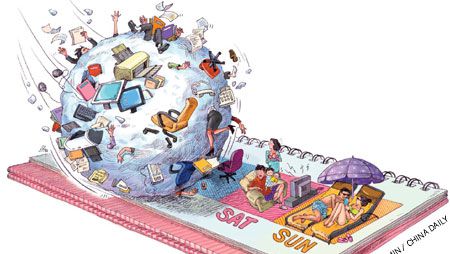White Collar Burnout (双语)
|
爱思英语编者按:社会变革的加快,竞争越来越激烈.生活节奏的加快,使得现代人心理承受着巨大的压力,产生一种身心能量被工作耗尽的感觉,这种感觉被称作“职业枯竭(burnout)”。
As China rockets towards its inevitable position as a financial and political giant, it has an almost vertical learning curve in bridging the gap between old work cultures and the demanding new pace. As another fat file lands on her desk, Wang Yan takes a deep breath and tries to calm her growing agitation. Fatigue shows in her eyes. As an attorney in a US law firm in Shanghai, Wang Yan works approximately 3,000 hours a year, which translates to 375 days on the job if it is averaged out to 8-hour days. "I can never catch up. Before one case is completed, my boss loads me with three more,” said she. She belongs to the generation most people believe is reaping the benefits of three decades of rapid economic growth. But these elite members of China`s new class of upwardly mobile are feeling the strain. Even as they strive to clamber up the corporate ladder, many are so drained by the effort that they are burning out. Statistics find a shockingly high proportion of employees suffering "job burnout", a term coined in the 1960s from the Graham Greene novel A Burnt-Out Case. It is now defined as a "psychological condition of emotional exhaustion and reduced sense of personal accomplishment". Yan Zhengwei, a psychological therapist, has seen more and more exhausted professionals coming to him in recent years. They are usually the elite of society and they know it. While losing interest in their work, they also face the dilemma of not knowing what else can interest them, according to Yan. He believes the root of the problem is pressure. Low- and mid-level managers suffer the most pressure. They are usually sandwiched between senior officers who give orders and their subordinates, whom they have to coax into productivity. They have to deal with long working hours, low job satisfaction, little control over their role at work and even less support from senior management. Small-town scholars hitting the big time in major cities are also likely to suffer more stress. For one, they have to work harder to overcome the prejudices of locality. And in a strange city, they are often without a familiar support network. Employees born during and after 1980s, the products of China`s one-child policy, are generally more pampered by parents and grandparents. They are the ones who are more likely to suffer burnout. That is because they cannot reconcile the treatment at home with the treatment at work and when success is not theirs, they feel thwarted. As businesses matured and market forces started to work, mergers and acquisitions have made employment less secure. The iron rice bowl is no more. 相关词汇 更多信息请访问:http://www.engbus.cn/ |









